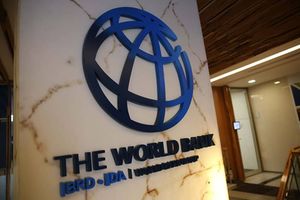What Sh1.5trillion Mkulazi Agriculture Investment City means to Tanzania’s economy

Tanzania Investment Centre Executive Director, Gilead Teri (seated on the right), and a representative of Longping Agriscirnce Tanzania Limited, Ms Jane Magembe Cheyo, sign documents during an event held in Dodoma over the weekend. Cabinet ministers and other senior government and private sector officials witness the occasion. PHOTO | COURTESY
What you need to know:
- The project entails a performance-based phased lease of 50,000 hectares of land for sugarcane production, as well as the establishment of sugar manufacturing facilities and mixed crop farming, which includes sugar beets
Dar es Salaam. Tanzania Investment Centre (TIC) has signed a $576 million (about Sh1.5 trillion) agreement with three prospective investors to develop Mkulazi Agriculture Investment City, located in Morogoro Region.
The agreement involves a performance-based stepwise lease of 50,000 hectares of land for sugarcane production, adequate sugar manufacturing, and mixed crop farming, including sugar beets.
The three implementing partners are the Egyptian-based The Food Platform, the Chinese firm Longping Agriscience Limited, and a consortium of Eagle Hills Properties Llc from Abu Dhabi, United Arab Emirates (UAE), the Egyptian Sugar (Egypt) and Global Cane Sugar (India).
Although the agreement involves the acquisition and utilisation of 50,000 hectares, 30,000 hectares would be utilised for the intended purposes at the starting point, which is equivalent to 10,000 hectares each.
Based on performance, two partners in sugar production can double their estate size with a future award of an additional 10,000 hectares each.
According to the agreement, the project will create 9,780 direct jobs and 11,500 indirect jobs.
It is expected to produce 150,000 tonnes of sugar annually, therefore significantly addressing the country’s endless sugar shortages.
The investment will also produce 65,000 tonnes of yellow corn and 30,000 tonnes of soybeans.
During the event, which took place over the weekend in Dodoma, the Tanzania Investment Centre (TIC) inked the documents for the Tanzanian government’s side.
Speaking exclusively to The Citizen, TIC Executive Director Gilead Teri said the $264 million (Sh686.4 billion) Eagle Hills consortium involves sugarcane farming and the commissioning of a sugar processing factory.
“It is anticipated to create 8,500 direct jobs and 10,000 indirect jobs. After the expansion, the factory is expected to have an annual sugar processing capacity of 150,000 metric tonnes, thereby addressing the sugar importation challenge facing the country,” he said.
On top of that, he said the project is also expected to generate 52 megawatts of electricity and produce 20 million litres of ethanol.
He said the Food Platforms will inject $290 million (Sh754 billion) for its sugar beet farming project and the commissioning of a sugar refining facility, which is expected to create 800 direct jobs and 1,000 indirect jobs.
“The project will have the capacity to produce 36,000 metric tonnes of high-quality refined sugar annually, reducing imports of refined sugar and increasing the national income through exports,” he said.
Furthermore, he said the Longpin Project will invest $22 million (Sh57.2 billion) in soybean and yellow corn production.
According to him, the project is expected to create 400 direct jobs and 500 indirect jobs.
“Upon completion, the project is expected to produce 30,000 tonnes of soybeans per season and 65,000 tonnes of yellow corn, totaling 95,000 tonnes per season. Most of this will be for export and instrumental in earning foreign exchange,” said Mr Teri.
Planning and Investment Minister, Prof Kitila Mkumbo, said the Mkulazi Agriculture Investment City is a unique project and a strategic initiative expected to revolutionise agriculture not only in Tanzania but also across the continent.
He said anticipations are that these projects will significantly contribute to reducing sugar importation and that produced grains will generate foreign exchange revenues through exports.
“In supporting efforts made by President Samia Suluhu Hassan in promoting investment and creating a conducive investment environment in Tanzania, I urge all Tanzanians to seize opportunities coming with these agreements,” he said.
“Citizens should benefit from these investments. We welcome citizens to visit our investment centre to obtain information on various available opportunities,” he added.
Agriculture Minister Hussein Bashe called on investors to ensure local communities significantly benefit from attracting investments in their respective areas through technology transfer and increasing understanding of modern farming techniques.
On behalf of investors, Food Platforms representative Mr Ibrahim Qammar said the improved investment environment has attracted his company to invest in the project and be part of the country’s economic transformation.
Mkulazi Agriculture Investment City is a project comprising 61,000 hectares envisaged for development as an agricultural hub by TIC, located in the Morogoro Region.
The area has ideal agroclimatic conditions, competitive yields, is cost-effective, and is well positioned to serve the growing of crops for local, regional, and global demands, therefore closing the food crop gap.
About 70 percent of the area is conducive to agricultural productivity, while the remaining 30 percent could be used for other purposes, such as the construction of light and heavy industries.




